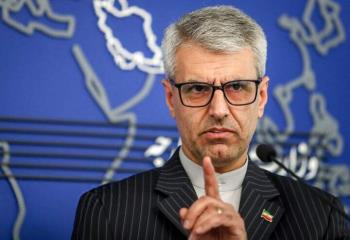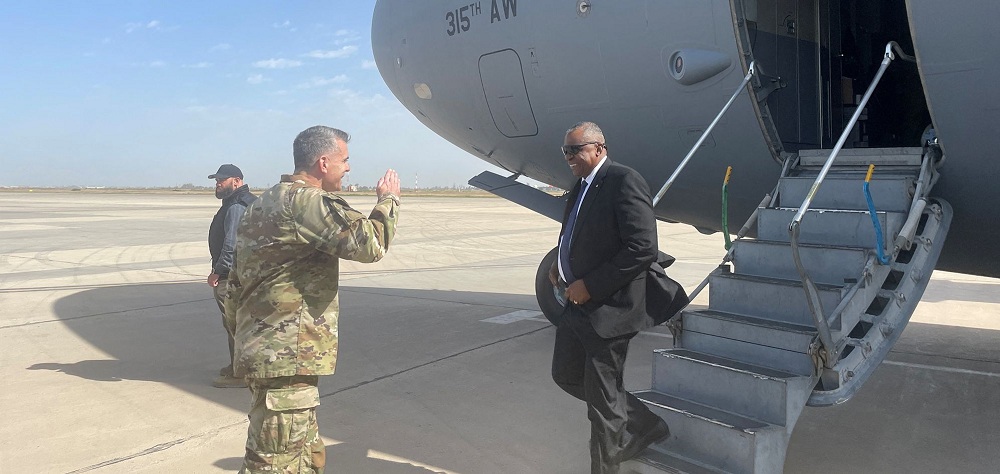Alwaght- Whereas in recent years the US has been moving to scaling down its military presence in the West Asia and Persian Gulf and ended its twenty-year struggle in self-made Afghanistan quagmire by exit from the country in August 2021, in a stance contradictory to this strategy, Washington is following different policy in Iraq. As one of the regions where US military bases are present in a large number, Iraq has maintained its significance for the Americans over the past two decades and the US policy in the country still insists on long-term military stay. In pursuit of this policy, the US Secretary of Defense in a surprise visit arrived in Baghdad on Tuesday. The visit, media outlets said, focused on discussing Washington-Baghdad military cooperation, especially presence in Iraq.
According to the Pentagon statement, in the meeting with the Iraqi Prime Minister, Austin emphasized the commitment of the US to providing advice and assistance and increasing the capabilities of the Iraqi security forces in order to ensure the defeat of ISIS terrorist group. Austin also said the significant progress of the Iraqi forces and their pioneering role in the fight against the terrorist group was worthy of praising and highlighted continuation of the process of returning ISIS refugees and prisoners from the northeastern regions of Syria. According to the statement, the US Defense Secretary and the Iraqi Prime Minister emphasized their commitment to long-term defense cooperation as the main pillar of the strategic and comprehensive partnership of the two countries.
Austin claimed that American forces are present in this country at the behest of the Iraqi government to help obliterate the ISIS terrorist group, and further emphasized Washington’s commitment to supporting the stability of Iraq. A Defense Department official, speaking on condition of anonymity, said the purpose of Austin’s trip was to show that Washington hopes to maintain a military presence in Iraq beyond the 20th anniversary of 2003 invasion. After meeting with PM Al-Sudani, Austin went to Erbil and talked with autonomous Kurdish region’s President Nichervan Barzani, and Massoud Barzani, the leader of the Kurdistan Democratic Party (KDP). The two sides discussed strengthening bilateral relations and stressed on efforts to establish security in the region, confront ISIS, and resolve disputes between Erbil and Baghdad.
Iraqis’ anger at Austin’s visit
The US presence in Iraq has become a serious challenge in recent years, with many Iraqis demanding withdrawal of the US “occupation forces”. However, Washington resists this demand— a resistance which, of course, is considered a hostile, destabilizing, and occupying action by a major part of the Iraqi political forces and has motivated military attacks on American installations and convoys in recent years. Now, with the revelation of the objectives of the US Defense Secretary’s trip and the negotiations with the Iraqi authorities on this controversial issue, the Iraqi resistance groups, who are not satisfied with anything less than the expulsion of the Americans, reacted to Austin’s Baghdad visit.
Abu Ali al-Askari, the head of the security bureau of the Iraqi Hezbollah Brigades, said: “The visit of the “American war minister” to Iraq was “an insult to the martyrs, the nation and the history of this country.” Stressing that Kata’ib Hezbollah will not commit to any understanding between the political parties and the occupying forces, Askari said the resistance group will “not wait for anyone’s permission to confront the occupation.”
Hassan Salem, a representative of the Sadeqoun coalition at the Iraqi parliament, which is close to the anti-terror Asa’ib Ahl al-Haq resistance group, also blasted the Pentagon chief’s visit to Iraq.
“To the occupying US defense minister! I condemn your trip and I do not welcome you because your hands are stained with the blood of Iraqi martyrs, especially the martyred commanders of victory, Abu Mahdi al-Muhandis and Qassem Soleimani,” Salem noted.
The Kata’ib Sayyid al-Shuhada anti-terror resistance group also censured the US official’s visit to Iraq and said it would not give in to pressure and would pressed ahead with the expulsion of the occupiers.
“Until now, the American occupier has not looked at Iraq as a part of the circle of allies in which it walks with security, and this (security) is the result of the blood of martyrs of resistance,” the resistance group said in a statement.
“This honor suffices for the Iraqi resistance that the occupying minister enters Iraq in a humble, fearful and worried manner; like the former official of his country “Donald Trump” who had to move between several planes in the dark of the night (during his trip to Iraq) for fear of being hit by the resistance,” it added.
The Kata’ib Sayyid al-Shuhada anti-terror resistance group underlined that the resistance “will not yield to any form of pressure”, adding that “it will wait but will not abandon its main goal of expelling the occupier from Iraq and ending all forms of occupation.”
Fatah (Conquest) Alliance, another powerful bloc in the Iraqi parliament, said the country’s resistance and political groups agree on the need to expel all American troops, noting that this is a “definitive” and “national” decision rather than a factional one and that if this does not happen, there are other choices for expulsion of the Americans.
Iraqi forces resolutely followed an agenda to expel the Americans from the country after assassination of top anti-terror commanders, Iran’s General Soleimani and Iraq al-Muhandis. Only a few days after the strike at Baghdad airport, the Iraqi parliament approved a bill demanding expulsion of American forces from the country. It asked then-PM Adel Abdel Mahdi to implement the bill. However, after three years, the Iraqi politicians have taken no steps forwards. Instead of expelling the Americans, the previous PM Mustafa al-Kadhimi visited Washington in July 2021 and signed agreements that further established the occupying forces in Iraq, triggering anger of Iraqis. Now that al-Sudani replaced al-Kadhimi with support from the Shiite Coordination Framework (SCF), the Iraqis expect him to do the job. But it seems that he is waking a path similar to his predecessor.
One of the demands of the SCF from al-Sudani was to conclude the case of American assassination of the resistance commanders and expel the US. The PM is under pressure from the resistance forces as he had promised to deal with these case, and this is now a national demand and any procrastination would be taken by the resistance groups and numerous opponents of the American military stay in Iraq a retreat of the government and against the national will.
Therefore, the resistance groups that are determined to expel the Americans will continue their path, and in the past three years, the American bases have come under dozens of attacks by unknown groups, and the wave of attacks on the American positions will likely increase in the future as the Iraqis find the US the main cause of insecurity and instability in their country.
The US claims that it is present in Iraq for fighting ISIS terrorists, but what is certain is that in the last ten years, the US military presence not only did not help to prevent rise and obliteration of such groups as ISIS, but also during the period of ISIS seizure of parts of Iraq, the US provided the group with the weapons it needed, and when ISIS commanders were surrounded by the resistance forces and their lives were in danger, the Americans rescued them from the battle in heliborne operations. The same scenario is being pursued now and Washington is trying to strengthen the terrorist sleeper cells and make Iraq insecure again. In recent days, Iraqi analysts warned that the US established “ISIS air taxi route” and is transporting terrorists from the west of the country to Diyala province in the east. Therefore, the claims to confront ISIS is only an excuse to consolidate long-term presence in Iraq.
On the other hand, the Americans always claim to strengthen strategic partnership with Iraq and help restore stability to the country but have so far done no move to allow Baghdad benefit from this ostensibly strategic partnership.
Over the past two years, the White House claimed that American forces were present in Iraq as advisors, but during this time, no American combat forces left Iraq and only evacuated some bases and moved to other ones, somehow continuing their occupation. Even recently they have built new facilities in the Ayn al-Assad base, signaling they have no intention to leave. But the resistance forces have repeatedly warned that if the government fails to expel the Americans, they will resort to force for their expulsion.
Countering Iranian influence on Iraq
Austin’s visit is said to have been paid for bilateral relation boost, but the reality is that a major part of American visits to Iraq is aimed at checking close Iranian-Iraqi ties and, specifically, cutting Iran’s influence in its neighbor. The same issue was on Austin’s visit agenda. The Defense Secretary follows many recent meetings between Iranian and Iraqi diplomats, which proved worrisome to the Americans who seek Iraqi assurances about continued stay in Iraq. The US considers Iran-Iraq upgrade of relations perilous to its regional interests and works to distance Iraq from Iran and consolidate its presence by engaging in strategic partnership.
Washington claims Iran is one of the main destabilizing factors in Iraq. During his Erbil visit, in interventionist remarks in a meeting with the Kurdish region’s president, Austin said: “We condemn Iran’s continuous attacks on the Kurdistan Region.... Baghdad and Erbil should cooperate with each other.” Austin’s comments come while the radical separatist groups in the autonomous region, who seek to destabilize Iran’s borders, are supported by the US and Israel and somehow fuel the insecurity on Iranian-Iraqi borders.
The Americans claim if they pull out of Iraq, the country will be taken over by Iranian influence, and given power gain of resistance forces, this claim is not unlikely. Therefore, they are pushing to extend their presence on 20th occupation anniversary. But the Americans have always evaded a question to avoid facing the fact about Iraqis’ opposition to continuation of occupation of their country: Why should they always seek ways to end Iranian influence and always lose the elections in Iraq to anti-American camp despite their 20-year stay and spending $7 trillion in the country?



























